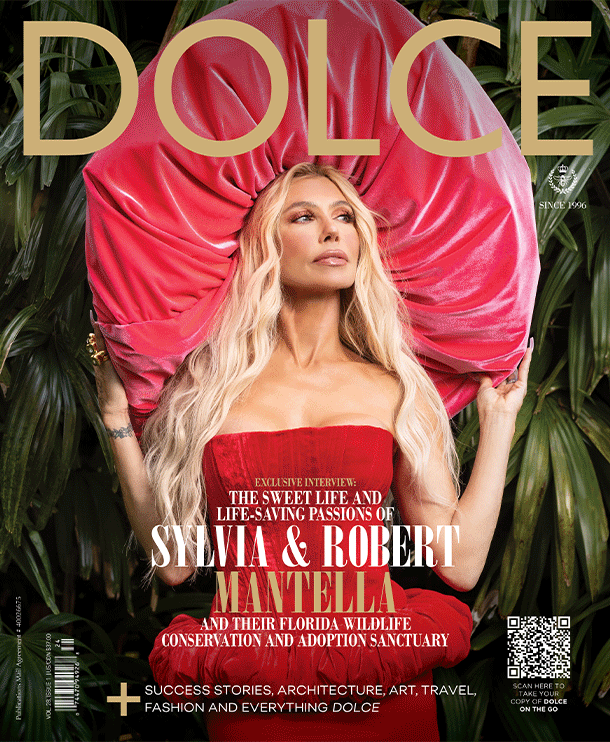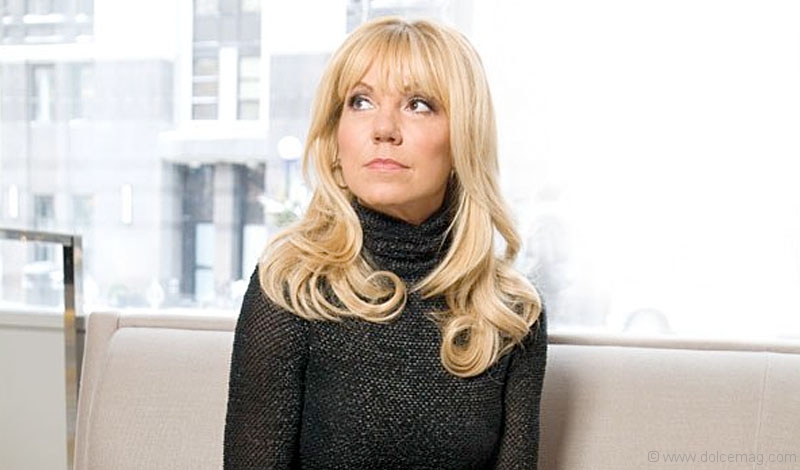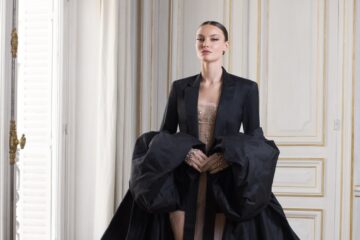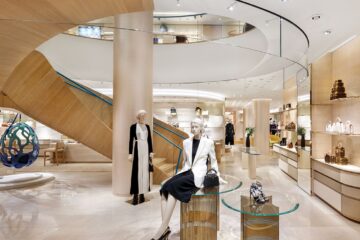Fotini: A Model Business
Robert Burke hasn’t forgotten the day Fotini Copeland walked into his NYC consulting firm. The former senior vice-president of fashion and PR for Bergdorf Goodman met the Greek-Canadian designer in 2010 when she sought his industry expertise on launching her eponymous label. “She was unique,” says the chairman and CEO of Robert Burke Associates, whose clients include Marc Jacobs, Marchesa and Vera Wang. “She was extremely well studied about brands and had a very distinct point of view. Her desire was to be an international brand, so she approached it, as she does everything, in a very strategic, thoughtful way.”
Two and a half years later, in the elevator ride up to the sixth floor of the Four Seasons Hotel Toronto, the mononymous designer is a duality of business and pleasure. Redolent of a modern-day Hitchcock blond in knee-high Gucci boots and a custom-print blouse from her personal collection, Fotini reveals that in Greek, her name means light. The serendipity is striking. Born in Athens, raised in Toronto and based in New York, Fotini is a fusion of Grecian gusto, Canadian compassion and American ambition.
At seven, she was fixated on tracing women’s silhouettes from paper doll cutouts and colouring on clothes with crayons. “It was my favourite thing to do on rainy days. I had a beautiful veranda that I used to sit on and I would just go out and escape and dream,” she says, sinking into a chaise in a private quarter of the boutique hotel. By eight, she was using a Barbie sewing machine and glue to bring her creations to life.
Taking direction from her strict hotelier father, Fotini put fashion aside and spent several years flexing her corporate muscles at Merrill Lynch, Molson and finally as the director of communications at a major store fixture business. It was the latter role that reignited her pursuit to turn paper doll reveries into reality. “That was what pulled the trigger to say to me ‘You need to go back and follow your dream.’”
To study the trade, Fotini travelled to Italy and spent time at corsetry houses in Bergamo, Bologna and Como, working with experienced artisans in beautiful ateliers. “It’s just that old-school way of creating and understanding the construction,” she says. After three years of research and hands-on experience, Fotini was ready for her next move.
She now credits her dad for encouraging her to sharpen her business acumen before breaking into one of the most cut-throat industries. “You need to have that creativity, but you also need to have an understanding of what it takes to grow a business and do proper market research, understand the fundamentals of going into an industry before just saying ‘I’m going to make pretty clothes,’ it’s just not the way the world works.” So, in the midst of the global financial crisis, she began developing a business model for a corseted-inspired line women would fall in love with.
From Missoni’s unmistakable zigzags, Pucci’s psychedelic swirls and Tiffany’s little blue box, powerful branding is the seam that keeps labels from falling apart. “Today, it’s not enough to just be creative. You need to be able to have an understanding of the market, of business, of branding,” says Burke. “The days are long gone where it was just being creative for creative sake, and [Fotini] had very much approached it as a creative person, but also as a business person.” Fashion, with its figurative fantasies and runway sugar rushes, requires a continuous flow of revenue to make it to the masses.
Even now, in her early stages, she has a strong sense of her identity and target market. “I understand my woman and I listen to her,” says Fotini, who admires the bold, sexy flavours of Tom Ford. “You have to persevere and, again, this is where you really need to understand financially and economically what your position is going in as an entrepreneur, so yes, it was a long haul but I was determined and here I am.” Her third collection, spring/summer 2013, which showed at Mercedes-Benz Fashion Week in New York, is a feminine, amorous ode to France, featuring hand-cut rose petals and wisteria prints on silk chiffon and organza gowns. “A big part of it was the watercolourists and the impressionists,” she says. “It was almost like painting a canvas.”
“She’s very clear on whom she wants to appeal to and how they live and how they dress, what they do,” says Burke. Her corseted, laser-cut, peplum Cleopatra gown gave the brand a boost when comedian Amy Poehler wore it to much fanfare at the 2012 Met Ball Costume Institute Gala. Though she’s heading back to New York City to finish up her fourth collection, Fotini feels the time is right to expand. “I’m still growing the business in the U.S. but I most definitely am very excited to come to Canada. This is my home and I’m very proud of it,” she says of her imminent plans to showcase her collection to Canadian retailers.
Every now and then Fotini thinks about that little girl who spent hours dreaming on her veranda. “I’ve learned my perseverance and strength have really been a part of who I am today, and not just career wise, I think personally I’ve had to overcome certain obstacles and ensure that I’m doing what I really want now and living it for myself.”
www.fotini-nyc.com
Photos by Jay Marroquin


















































































No Comment